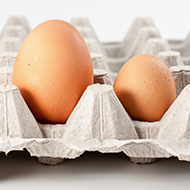Avoid large eggs to protect hen welfare, consumers urged

More than 42 per cent of eggs laid by commercial hens are large or extra large.
The British Hen Welfare Trust (BHWT) is urging consumers to buy small, medium or mixed weight eggs in a bid to protect the welfare of laying hens.
The rehoming charity says around half the eggs laid by commercial chickens are large or extra-large, which can cause health problems such as prolapse.
BHWT founder Jane Howorth MBE said: “Mixed weight eggs are currently sold by a handful of supermarkets, but generally shopping habits remain stuck in the outdated ‘big is best’ mindset. Everyone’s a winner if we simply change our thinking.
“Small or mixed weight eggs provide consumers with a bigger yolk to white ratio, farmers get a fairer price for each egg laid regardless of size and most of all it takes the pressure of our hardworking hens and allows them to do what comes naturally without interference from genetic modification.”
Ms Howorth was recently invited to speak at the Guild of Food Writers, during which she took the opportunity to encourage influential food writers and chefs to switch their thinking on egg size when writing recipes. She stressed that more than 42 per cent of eggs laid by commercial hens are large or extra-large, with many smaller eggs being downgraded for use in the processed food sector.
The BHWT said: 'Ask any hen keeper who listens to their hens after producing an egg, and they’ll tell you there’s generally considerable squawking, and the squawk seems to increase in decibels the larger the egg!
'The BHWT asks consumers to buy small, medium or mixed weight eggs to help hens – you’ll get more yolk for your money if you do, and the farmers and the hens will thank you.'



 The Federation of Independent Veterinary Practices (FIVP) has announced a third season of its podcast, Practice Matters.
The Federation of Independent Veterinary Practices (FIVP) has announced a third season of its podcast, Practice Matters.